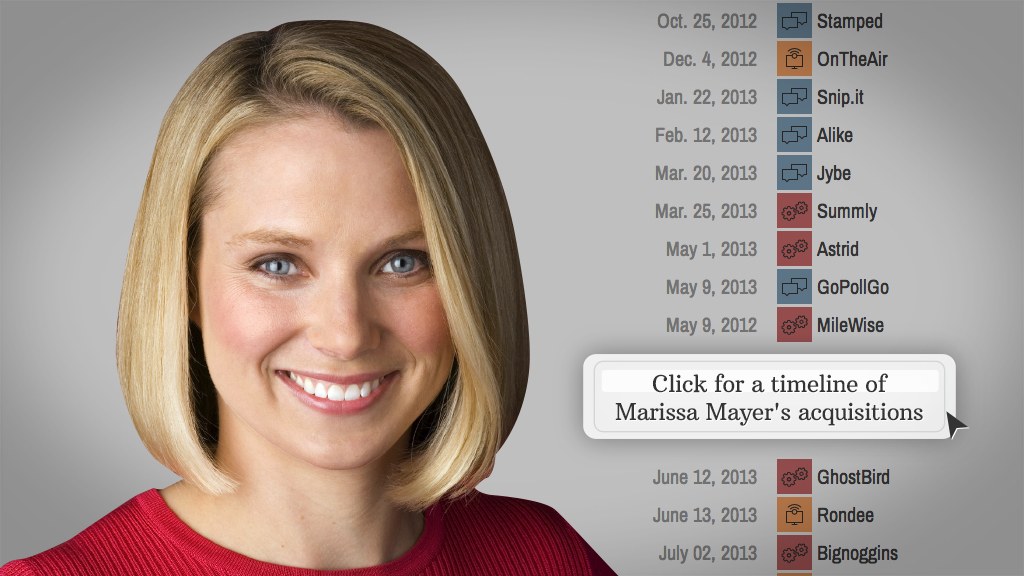Yahoo CEO Marissa Mayer likes to shop.
During Mayer's one-year tenure -- her start date was a year ago Wednesday -- Yahoo has bought an incredible 16 startups. And she didn't even start the buying spree until she'd been CEO for three months.
Since then Yahoo's acquisitions have been made at a breakneck pace, with the company sometimes announcing two purchases in a single day, or six over the course of a month.
"It is just astounding how truly active Yahoo has been on the M&A front," said S&P Capital equity analyst Scott Kessler. "They're mostly buying very small companies, but still -- I don't know that any other company has matched this pace of buying."
Mayer was likely inspired by her former employer Google (GOOG), which often buys small companies in order to gain talented staffers. Mayer's spin on that strategy is a key part of her plan to turn around the struggling Yahoo (YHOO), and the trail of purchases offers a glimpse at how she views the company's future.
Mobile first. As smartphones and tablets continue to fly off store shelves, Mayer has made it clear she's laser-focused on mobile. Almost all of the 16 startups Mayer has bought were centered on mobile content, apps and services.
"[Mayer] is pulling in people who are excited about mobile, people who want to build a winning culture," said JMP Securities analyst Ron Josey. "Yahoo needs that badly. That cannot be understated, given that [Mayer's] main strategy is to make Yahoo a company that builds products people are excited to use every day."
But Yahoo has been mainly interested in those companies for their engineering talent, also known as the "acqui-hire" method. Yahoo shut down all but three of the 16 companies it purchased in the past year, and many of the startups' teams joined the company's mobile staff. (Only blogging platform Tumblr, gaming infrastructure creator PlayerScale and video app Qwiki have survived.)
Related story: Tech's highest paid CEOs
Focus on key growth areas. All of Yahoo's acquisitions under Mayer have fallen into one of four buckets: core business (content, apps and search), social, gaming, and video (chat and conference calling).
"If you think about the direction of the Web, these are all huge areas," said Kessler, the S&P Capital analyst. "This isn't about just acquiring staffers -- this is about using these companies' technology to enhance and improve what Yahoo already has."
The most obvious example: After Mayer brokered a deal with 15-year-old founder Nick' D'Aloisio to acquire his news aggregation app Summly, Yahoo relaunched its flagship mobile app to include Summly summaries.
"Marissa Mayer is well connected in [Silicon] Valley, and she knows what's buzzy and what's working," said JMP analyst Josey. "She can pull from companies doing smart things in growing areas of the Web, and try to make Yahoo more like them."
Make Yahoo cool again. Mayer's buying strategy mirrors her overall revamp of Yahoo during the past year.
She has successfully overhauled the corporate culture, which has been enough to lure back some former Yahoos: During the company's first-quarter earnings call, Mayer proudly announced that 14% of all hires during the quarter were "boomerangs," or people who had worked at the company previously.
To entice users, Mayer relaunched Yahoo mobile apps, totally redesigned the Flickr photo service and released a cleaner search results page.
Investors have been pleased, too: Shareholders cheered when Mayer sold back a significant portion of its stake in Chinese company Alibaba, which in turn helped fuel Yahoo's large share buyback program.
"All of these, including the [startup acquisitions], are pieces of Mayer's overall plan to get employees, users and shareholders excited about Yahoo," Josey said. "It's a big challenge, and you need multiple approaches to really turn a company around."
Yet some analysts aren't convinced that a turnaround is possible.
"I'm skeptical about the company's ability to reinvent itself the way people expect," Kessler said. "That's not a knock on Marissa Mayer as much as it's an acknowledgment that these types of undertakings are extremely difficult. It's hard to go from a dying company to a market leader."


